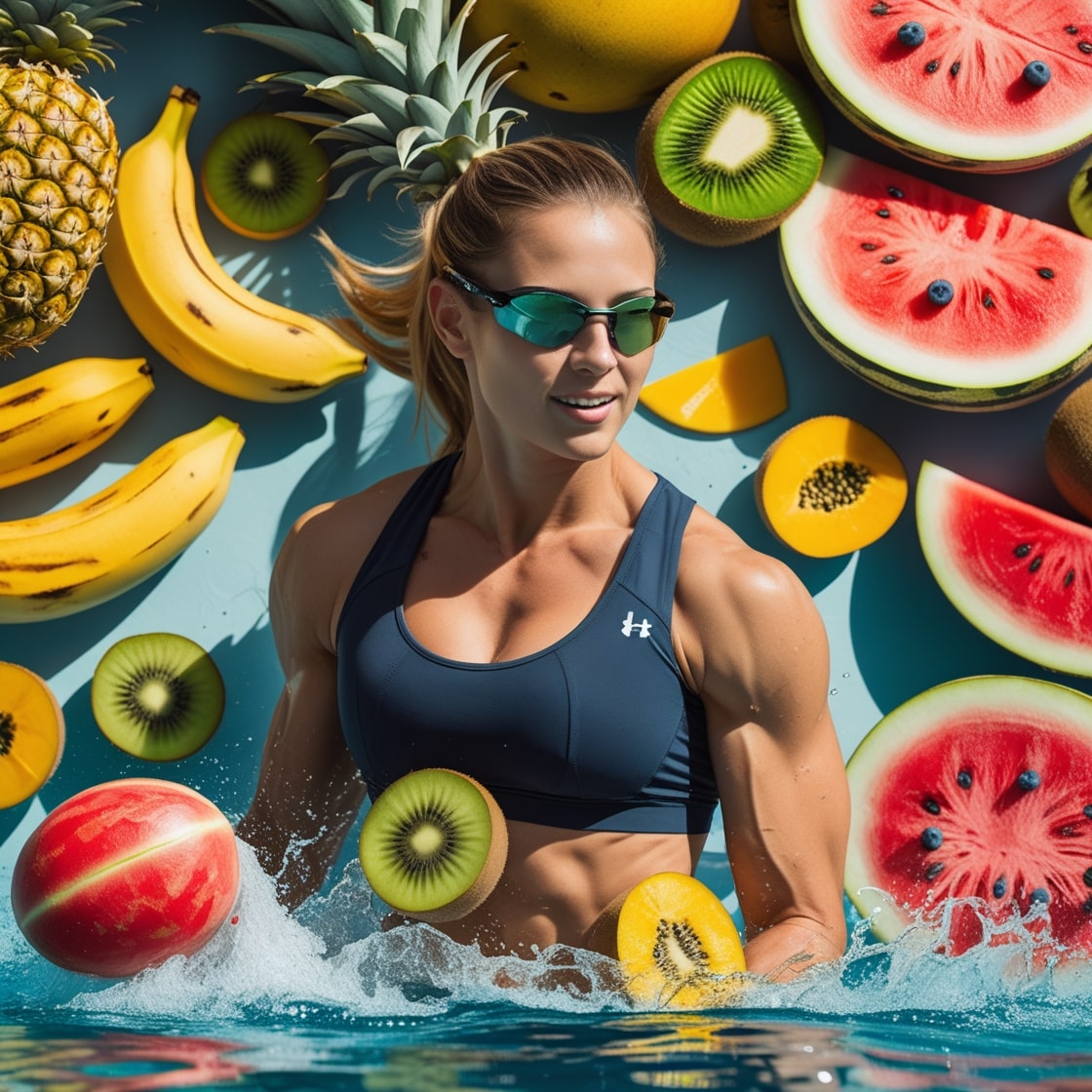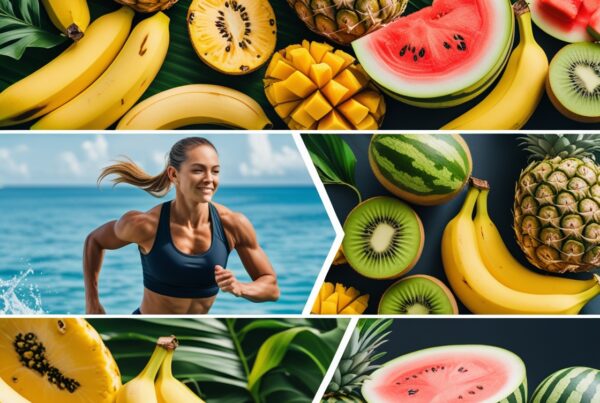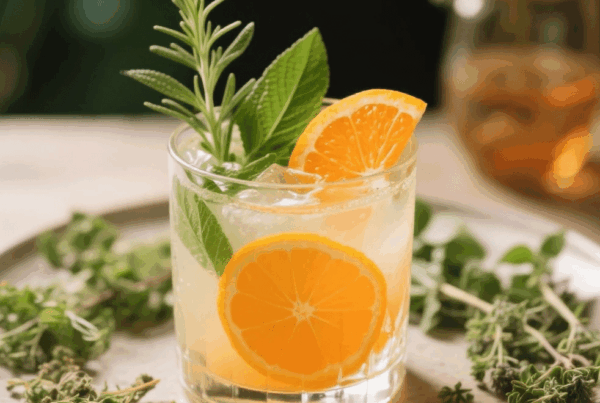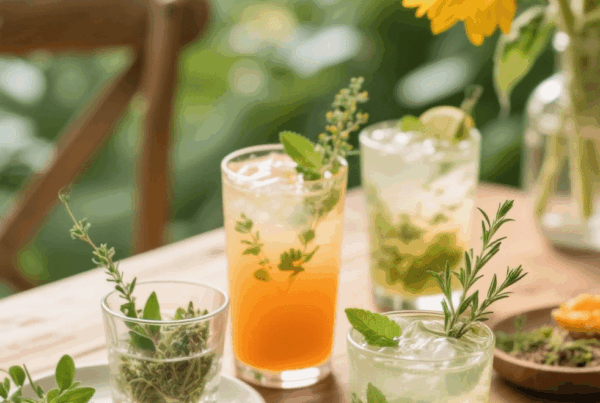Feeling sluggish mid-workout? Struggling to push through that final mile?
You’ve probably heard about protein shakes and fancy supplements – but there’s a surprisingly simple, delicious way to boost your performance.
Many athletes overlook this natural powerhouse of nutrients.
Imagine effortlessly powering through your toughest training sessions, recovering faster, and maximizing your potential.
Let’s dive into the vibrant world of tropical fruits – and discover how they can unlock a new level of endurance and recovery for you.
Tropical fruits boost energy
Do you ever feel like your energy crashes just when you need it most during a workout or long day?
That mid-afternoon slump isn’t just fatigue; it’s often a lack of fuel for optimal performance.
Think about how athletes meticulously plan their nutrition – this is the same principle applied to your body’s energy needs.
Tropical fruits offer a natural, potent solution, packed with vitamins and electrolytes that can dramatically improve stamina.
Ignoring this simple nutritional boost means missing out on sustained power and quicker recovery times.
But here’s what isn’t widely discussed: the right tropical fruit choices can be a game-changer for your physical output – far beyond just taste.
Let’s explore exactly which fruits deliver this powerful advantage, and how incorporating them into your routine could transform your performance.
The Science of Fruit
Think about how your body fuels itself during intense activity. You need sustained energy, and that’s where tropical fruits come in. They offer a unique blend of nutrients that can significantly impact endurance and recovery.
The science behind it centers around carbohydrates – specifically sugars like fructose and glucose – found abundantly in these fruits. These sugars are rapidly absorbed by the body, providing quick bursts of energy for demanding physical tasks.
Consider mangoes or papaya; they’re packed with simple sugars that give you a noticeable boost when you need it most during exercise. Bananas are another prime example – a classic choice for athletes due to their easily digestible carbohydrate content.
Beyond the immediate energy, tropical fruits deliver potassium, an electrolyte crucial for maintaining fluid balance and nerve function. You lose electrolytes through sweat, so replenishing them is vital for optimal performance and preventing muscle cramps.
Pineapple, for instance, boasts a high potassium content alongside enzymes that may aid in digestion and reduce inflammation after strenuous activity. Guava offers similar benefits, supporting muscle recovery by helping to regulate fluid balance.
Essentially, these fruits provide both the fuel you need *during* exercise – quick energy from sugars – and the support your body requires *afterward* – electrolytes for repair and hydration. It’s a powerful combination that can elevate your performance and accelerate recovery.
Electrolytes & Hydration Boosts
As tropical fruits offer a fantastic boost for performance, it’s important to understand what makes them so beneficial.
Many contain electrolytes— minerals like potassium, sodium, and magnesium— that are lost through sweat during intense activity. Replenishing these is key to maintaining proper hydration and preventing muscle cramps.
Bananas, for instance, are packed with potassium, which helps regulate fluid balance in your body. Mangoes provide a good dose of vitamins and minerals as well as electrolytes that can help you stay hydrated.
Beyond electrolytes, tropical fruits often boast high water content— contributing significantly to hydration levels.
Papaya, with its juicy flesh, is incredibly hydrating. Pineapple contains enzymes that aid digestion, assisting your body in efficiently absorbing fluids.
So, incorporating these vibrant fruits into your diet can not only fuel your performance but also actively support optimal hydration and electrolyte balance— crucial factors for endurance and effective recovery.
Carbs for Sustained Performance
Just when you need sustained energy during a long workout or race, tropical fruits can be a fantastic choice. Let’s talk about why these vibrant options are packed with carbs that keep you going.
Many tropical fruits are naturally high in carbohydrates – this is what your body breaks down for fuel! Think of it like giving yourself a steady stream of energy rather than a quick burst.
Mangoes, pineapples, and bananas are particularly good examples. They contain simple sugars like fructose and glucose which are quickly absorbed by the body, providing an immediate boost when you need it most. This is crucial for maintaining consistent performance levels throughout your activity – whether that’s a marathon or a tough gym session.
Beyond just quantity, the *type* of carbohydrate matters. Tropical fruits offer easily digestible carbs compared to some other options.
This means they’re broken down and utilized by your muscles more efficiently, reducing digestive discomfort and maximizing energy delivery. It’s about choosing fuel that works *with* your body, not against it, especially when you are pushing yourself physically.
Unique Antioxidant Profiles Explained
True tropical fruits offer a truly unique antioxidant profile – one that’s unlike anything found in more common produce. You see, these fruits have evolved alongside their environments, developing specialized defenses against intense sun exposure and other stressors.
This translates to incredibly high concentrations of specific antioxidants, like lycopene in watermelon or beta-carotene in mangoes – compounds that actively combat oxidative stress within your body.
Consider papaya; it’s brimming with vitamins C and E, powerful allies against cellular damage. Or think about guava – packed with vitamin C and flavonoids that offer potent anti-inflammatory benefits.
These aren’t just ‘vitamin boosts’; the antioxidant profiles are distinct. Each tropical fruit boasts a blend of compounds tailored to its native ecosystem.
For instance, passionfruit is rich in anthocyanins, pigments responsible for their vibrant color and known for their ability to protect against free radical damage. You’ll find that these diverse antioxidants work synergistically – amplifying each other’s effects.
Understanding this unique antioxidant makeup allows you to strategically fuel your performance and recovery, maximizing the benefits of these delicious fruits.
Beyond Bananas – Unexpected Choices
Beyond bananas, there’s a whole world of tropical fruits that can really help you fuel your performance and aid recovery. It’s easy to think of banana as the go-to choice, but these other options pack some serious nutritional punches.
Mangoes, for example, are loaded with vitamins A and C – both powerful antioxidants that combat oxidative stress caused by intense exercise. Papayas contain bromelain, an enzyme known to reduce inflammation which can help soothe sore muscles. And coconut water is naturally hydrating and contains electrolytes like potassium, lost through sweat during strenuous activity.
These fruits aren’t just about immediate energy; they offer sustained fuel thanks to their complex carbohydrates and fiber content. Unlike simple sugars that provide a quick spike and crash, these nutrients deliver a steadier release of energy for longer workouts or recovery periods.
While bananas are great for a quick boost, many other tropical fruits offer a more complete nutritional profile to support your body’s needs during and after physical activity.
Incorporating these unexpected choices into your routine can significantly impact how you feel – reducing muscle soreness, boosting hydration, and supporting overall recovery. It’s about adding layers of support to your performance strategy!
Tropical Fruits & Muscle Repair
It’s amazing how much your body needs after a tough workout or intense activity. You might be surprised at just how powerfully tropical fruits can contribute to muscle repair and boost your performance!
Many tropical fruits are packed with electrolytes – things like potassium, sodium, and magnesium – which get lost through sweat during exercise. Replenishing these is absolutely crucial for proper muscle function and preventing cramps.
Think about it: Bananas are a classic for a reason! They’re loaded with potassium, helping to regulate fluid balance and reduce muscle soreness. Mangoes offer magnesium, vital for muscle relaxation and nerve function. Papaya contains enzymes that aid digestion – which is important when your body is working hard to repair itself.
Beyond electrolytes, these fruits are brimming with antioxidants. Intense physical activity creates oxidative stress in the muscles, so a boost of antioxidants can help combat this damage and speed up recovery.
Pineapple, for example, contains bromelain – an enzyme known for its anti-inflammatory properties. This helps to reduce swelling and discomfort after exercise. And coconut water, well beyond just electrolytes, provides vitamins and minerals that support overall cellular repair.
The Gut-Brain Connection in Endurance
After the gut is a powerhouse when it comes to endurance performance. You see, your digestive system isn’t just about processing food; it’s intimately linked with how you feel – both physically and mentally – during an activity like running or cycling.
This connection is what’s known as the gut-brain axis. It’s a two-way communication network between your digestive system and your central nervous system. And it plays a huge role in how you fuel your performance, especially when things get tough.
Think about it: When you’re pushing yourself during an endurance event, your body demands energy quickly. The nutrients absorbed from food—particularly carbohydrates—are broken down and used to power your muscles. But the type of carbs matters! 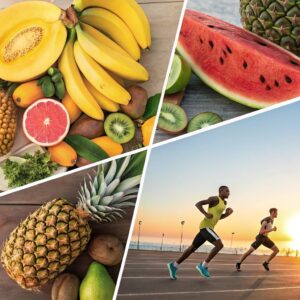 Tropical fruits – like bananas, mangoes, papaya, and pineapple – are particularly beneficial because they’re rich in easily digestible sugars that provide a rapid source of energy for your muscles. Plus, they’re packed with vitamins and minerals that support overall health and recovery.
Tropical fruits – like bananas, mangoes, papaya, and pineapple – are particularly beneficial because they’re rich in easily digestible sugars that provide a rapid source of energy for your muscles. Plus, they’re packed with vitamins and minerals that support overall health and recovery.
These nutrients help to maintain stable blood sugar levels, which is crucial for sustained endurance. And the good bacteria thriving in a healthy gut can even influence mood and reduce feelings of fatigue – giving you an extra mental boost when you need it most.
Strategic Fruit Consumption Timing
If timing your fruit intake is key for maximizing performance and recovery, let’s talk about when to eat. It isn’t just about grabbing a banana before a run; it’s about strategically fueling your body at specific moments.
Consuming carbohydrates shortly after intense activity is crucial— this helps replenish energy stores and kickstart the repair process.
Within 30-60 minutes post-workout, you want to focus on easily digestible carbs like a banana or some dates. These provide quick fuel for your muscles and help reduce muscle soreness.
For longer endurance events – think marathons or triathlons – timing is even more critical.
During the event itself, you’ll want to consume easily digestible carbohydrates like gels or chews— these provide a sustained energy source and combat fatigue. It’s about maintaining consistent fuel levels throughout your activity.
So, think of carbohydrate-rich fruits as part of a strategic fueling plan— carefully timed for optimal performance and recovery after any physical exertion.
Combining Tropical Fruits for Synergy
Even combining tropical fruits can create a powerful synergy that fuels your performance. You’ll find it’s like layering different tools – each one contributes to the overall effect.
Think about it this way: some fruits are great for quick energy, while others offer sustained release and recovery support.
For a rapid boost, consider pairing mango with pineapple. The mango provides natural sugars for immediate fuel, while the pineapple adds bromelain – an enzyme that aids digestion and reduces inflammation after exertion.
Now let’s talk about sustained energy: Bananas are fantastic for potassium replenishment which is key to muscle function. Combine them with papaya – rich in antioxidants that help combat oxidative stress caused by intense activity.
This layered approach – a quick burst followed by recovery support – allows you to maintain peak performance and minimize fatigue. You’re essentially giving your body the tools it needs at every stage of the process.
Assessing Fruit Ripeness & Enzymes
People seeking peak performance often overlook a key component: fueling their bodies effectively. And when it comes to endurance and recovery, tropical fruits can be a game changer. But simply grabbing any brightly colored fruit won’t cut it—understanding ripeness and the enzymes within is crucial.
Assessing fruit ripeness directly impacts its nutritional value and how your body utilizes it.
For example, a green banana contains resistant starch, which isn’t fully digested and can actually slow down digestion—not ideal for immediate energy. Conversely, a perfectly ripe mango bursts with enzymes that aid in carbohydrate breakdown, providing readily available fuel.
These enzymes are vital because they help your body process sugars more efficiently.
Think of it like this: some fruits contain amylase, an enzyme that breaks down complex carbohydrates into simpler sugars. This means your body can access those nutrients faster, giving you a sustained energy boost during intense activity.
So, choosing ripe fruit—one with vibrant color and a fragrant aroma—and understanding the enzymes they contain allows you to optimize your fuel for peak performance and efficient recovery.
Tailoring Tropical Fruit to Sport
Many athletes seek ways to optimize their performance, and tropical fruits offer a fantastic opportunity for that. These vibrant treats aren’t just delicious; they can significantly impact your endurance and recovery efforts.
Consider what you need during training— carbohydrates are key for sustained energy. Tropical fruits deliver quick-acting sugars like glucose and fructose, fueling muscles effectively.
Bananas, for example, are a classic choice due to their potassium content – vital for muscle function and preventing cramps. Mangoes provide readily available sugars that quickly boost your energy levels during intense workouts.
Recovery is just as important as performance, and tropical fruits can help with this too. They’re packed with antioxidants which combat oxidative stress caused by exercise.
Pineapple contains bromelain, an enzyme that aids in reducing inflammation – a critical factor for muscle repair after strenuous activity. Papaya is another excellent choice, rich in vitamins and enzymes to promote faster healing.
Therefore, strategically incorporating tropical fruits into your diet— focusing on those with high carbohydrate content alongside antioxidant properties— can truly fuel your performance and accelerate your recovery process.
Optimizing Recovery Post-Activity Intake
Have you ever noticed how quickly your energy dips after a tough workout? It’s not just about feeling tired; it’s about replenishing what your body lost during that intense effort. And fueling recovery properly is key to maximizing performance – both now and going forward.
Tropical fruits can be a fantastic tool for optimizing recovery post-activity intake. They offer a unique blend of nutrients that support muscle repair and rehydration.
Consider options like mangoes, rich in Vitamin C which aids in collagen production – crucial for tissue repair after exercise. Or bananas, packed with potassium, an electrolyte lost through sweat that’s vital for maintaining fluid balance. These help you bounce back faster!
The sugars found in many tropical fruits—like pineapple or papaya—provide a readily available source of energy to kickstart the replenishing process.
These natural sugars are absorbed quickly, helping to refuel glycogen stores depleted during exercise. This is especially important for endurance activities where sustained energy levels are critical.
Essentially, incorporating these tropical fruits into your post-workout routine can significantly enhance recovery, supporting muscle repair and boosting overall performance – allowing you to get back to what matters most.
Unlock Your Peak Potential: Fueling Bodies for Serious Performance
It’s clear that sustained effort demands more than just grit; it needs strategic nourishment.
Incorporating tropical fruits into your routine isn’t simply about adding a touch of sweetness to your day—it’s about optimizing cellular function and supporting peak physical performance. These vibrant fruits are packed with electrolytes, antioxidants, and carbohydrates that directly combat fatigue and accelerate recovery after intense exertion. Think mangoes replenishing potassium lost through sweat, pineapples aiding digestion for efficient nutrient absorption, or papaya providing enzymes crucial for breaking down muscle tissue post-workout.
The science is compelling: strategic fueling dramatically improves endurance, reduces muscle soreness, and accelerates the body’s natural repair processes. Delaying this vital replenishment means prolonging discomfort and hindering your ability to reach your full potential. Prioritizing tropical fruits as part of a comprehensive strategy delivers tangible results – enhanced stamina, quicker recovery times, and ultimately, greater success in any demanding activity.
Start incorporating these powerhouse fruits into your diet today and experience the transformative power of targeted nutrition. Embrace this simple change; feel the difference, and unleash a new level of performance within yourself!

